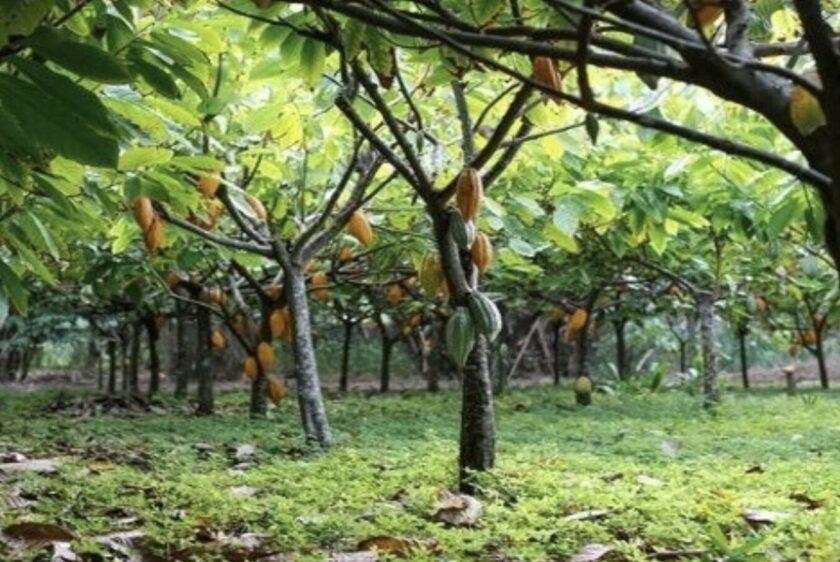Share:
This article is written by Dr. Patrick Ofori, a Senior Research Scientist and Head of the Soil Microbiology Division at the Council for Scientific and Industrial Research (CSIR) – Soil Research Institute in Ghana and is titled ‘Biochar application for sustainable cocoa seedling production in Ghana’.
Cocoa is an important cash crop for Ghana, the country’s number one foreign exchange earner, and a source of employment for farmers. The success of cocoa cultivation depends on using quality cocoa seedlings for planting. One major problem facing the cocoa value chain in Ghana is farmers’ lack of access to quality cocoa seedlings. Most cocoa seedlings are planted in small quantities in nutrient-poor soils, resulting in malnourished seedlings that become prone to disease infection and do not survive when transplanted in the open environment.
Improving the quality of the growing medium for seedling production is a major target to increase cocoa production to meet Ghana’s local and export demand. A good quality growing medium can improve seedling growth to produce higher-quality seedlings for transplanting.
The fertility of soils used in nursery bags for cocoa seedling production can be improved through the addition of biochar as a soil amendment. Biochar from cocoa pod husk could be a more sustainable approach to improving the fertility of soils used in nurseries for quality cocoa seedling production.

Biochar has been proven to improve soil fertility as a soil conditioner through its impact on the soil’s physical, chemical, and biological properties. Biochar from cocoa pod husk has a complex structure with potential as plant growth media for cocoa seedlings.
Biochar can improve the chemical properties of soil by increasing soil pH, improving plant nutrient availability, and releasing cations such as potassium, magnesium, calcium, and sodium. Biochar also improves nutrient retention in soils, reducing the leaching of nutrients such as N, NO3, K, P, Mg, Na, and Ca.
The effects of biochar application on plant growth depend on several factors, including the soil type/texture, the amount of biochar applied, and the type of biomass feedstock used in the production of the biochar.
Studies show that the amendment of coarse-textured soils with biochar increases their capacity to absorb water compared to fine-textured soils. There is also a significant effect of biochar application on water retention, and the water retention capacity differed among soils based on the type of biochar applied.
Biochar has the potential to significantly improve soil health for the sustainable production of quality cocoa seedlings within the cocoa value chain when given the needed attention. Over the past decade, research work on biochar application as a soil amendment for crop production in Ghana has focused mainly on non-tree crops such as maize, rice, and other vegetables, with no information on its effects on tree crops such as cocoa, coffee, cashew, mango, etc.
Application rates and frequency of biochar application
Biochar application at high rates results in increased plant growth due to improved soil water and nutrient supply. Low amounts of biochar application have less visible or no growth impacts on plant species, whilst excessively higher doses have a limiting effect on plant growth.
Studies in Indonesia have shown that the application of about 9g of cocoa pod husk (CPH) biochar kg-1 soil, which is equivalent to about 20 tons of CPH biochar ha-1, significantly improved soil properties and the growth of cocoa seedlings.
There is a need to conduct more research in determining the optimum application rate of biochar for cocoa seedling production in Ghana, as the effect of biochar application varies with the soil type.
The frequency of biochar application will depend on the specific needs of the crop and soil. Generally, biochar can be applied at a rate of 10-20 tons per ha-1 and may be reapplied every 2-5 years as needed. The optimal application rate and frequency of application will vary depending on factors such as soil type, biochar type, and climate. This may require some experimentation to determine the best option for soils in cocoa-growing areas of Ghana.
Quantities of biochar to apply per tree/seedling based on the application rate For cocoa seedlings production:
Volume of soil: (25×30 cm), Quantity of soil = 5 kg
Application Rate: 20 tons CPH biochar ha-1 (10g CPH biochar kg-1 of soil)
For field application
Application rate: 10 tons CPH biochar ha-1
Number of trees in 1 ha = 1087
Quantity to apply per tree= 10000/1087= 9kg of CPH biochar/tree
Application rate: 20 tons CPH biochar ha-1
Quantity to apply per tree= 20,000/1087= 18 kg of CPH biochar /tree
About the author:

Dr. Patrick Ofori is a Senior Research Scientist and Head of the Soil Microbiology Division at the Council for Scientific and Industrial Research (CSIR) – Soil Research Institute in Ghana. His research focuses on environmental and soil resource management, with a particular emphasis on soil biology and fertility. He specializes in utilizing climate-smart biological technologies to enhance soil fertility, thereby increasing crop production and improving soil health.
Dr. Ofori earned his PhD in Soil Science from the Kwame Nkrumah University of Science and Technology in 2016. He also holds a Master’s degree in Environmental and Resource Management from Brandenburg University of Technology, Cottbus-Senftenberg, Germany, and a Bachelor’s degree in Biological Science (Zoology/Botany) from the University of Cape Coast.
His research interests include sustainable soil fertility management systems, particularly the use of organic amendments such as compost and biochar to improve soil fertility.
In recognition of his contributions, Dr. Ofori was promoted to Senior Research Scientist in 2022.











